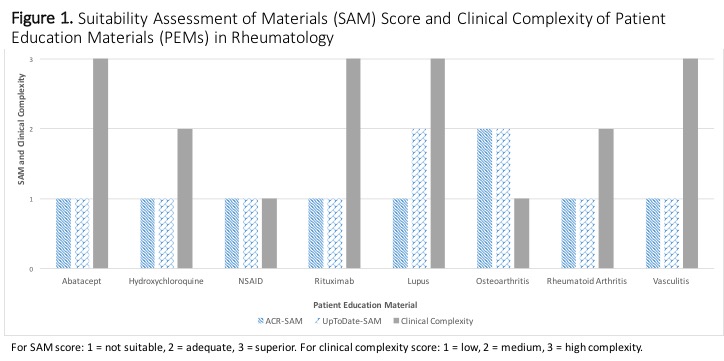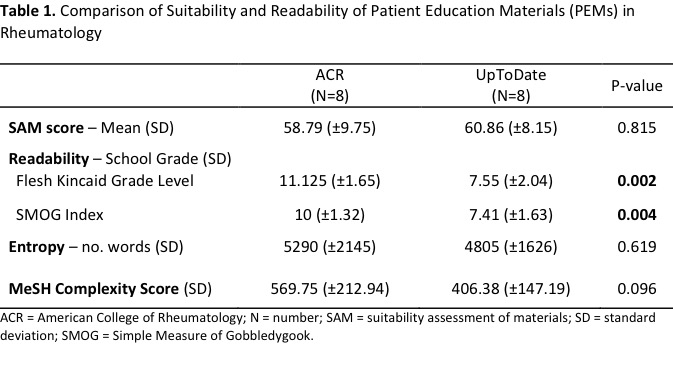Session Information
Session Type: ACR Poster Session A
Session Time: 9:00AM-11:00AM
Background/Purpose: Low health literacy and reading ability of rheumatologic patients is associated with poor outcomes [1]. In practice, patient education is commonly delivered via patient education materials (PEMs). However, readability of PEMs has been reported to be high and PEMs remain poorly understood [2]. We sought to determine the suitability of PEMs used in rheumatology practice.
Methods: Sixteen PEMs from 2 resources (ACR 2015 & UpToDate Basics 5-2017) were analyzed. PEMs on 4 diseases (OA, RA, SLE, vasculitis) and 4 treatments (abatacept, hydroxychloroquine, NSAIDs, rituximab) were scored for clinical complexity by 16 clinical rheumatologists. Suitability assessment of materials (SAM), a validated method to assess health-related educational resources, was used to score PEMs by 3 reviewers [3]. SAM scores were categorized and mean scores reported. Readability was measured by validated methods. PEMs were additionally assessed with 2 novel tools: information entropy and medical subject heading (MeSH) complexity. These methods provide further insight into information quantity and content complexity of PEMs. We compared means for ACR and UpToDate PEMs by Student t-test (1-sided alpha=0.05).
Results: Sixteen PEMs were rated by SAM: 3 were superior (with 2/3 on OA) and 13 were adequate (Figure 1). The mean SAM score for disease-PEM was highest for OA and lowest for vasculitis, and for therapy-PEM was highest for NSAIDs and lowest for abatacept. Mean SAM, information entropy and MeSH complexity scores did not significantly differ between ACR and UpToDate (p>0.05) (Table 1). Readability was at 6th grade for only 4 PEMs (all UpToDate) while it was >8th grade level for 12 PEMs; 4 ACR PEMs had readability >12th grade. Mean readability grade was significantly higher for ACR compared to UpToDate (p=0.002).
Conclusion: The suitability of PEMs in rheumatology is adequate at best for less complex topics but remains low for clinically complex topics. The majority of PEMs exceed the recommended 6th-grade reading level, especially PEMs by ACR. Development of personalized PEMs in rheumatology is needed to improve patient health literacy and impact outcomes.
References:
1. Hirsh JM, et al. Limited health literacy is a common finding in a public health hospital’s rheumatology clinic and is predictive of disease severity. J Clin Rheumatol. 2011 Aug;17(5):236-41.
2. Rhee RL, et al. Readability and suitability assessment of patient education materials in rheumatic diseases. Arthritis Care Res (Hoboken). 2013 Oct;65(10):1702-6.
3. Doak CC, et al. Teaching patients with low literacy skills. 1985. Lippincott.
To cite this abstract in AMA style:
Lenert A, Kim S. Patient Education Materials in Rheumatology: Only Adequate at Best [abstract]. Arthritis Rheumatol. 2017; 69 (suppl 10). https://acrabstracts.org/abstract/patient-education-materials-in-rheumatology-only-adequate-at-best/. Accessed .« Back to 2017 ACR/ARHP Annual Meeting
ACR Meeting Abstracts - https://acrabstracts.org/abstract/patient-education-materials-in-rheumatology-only-adequate-at-best/


